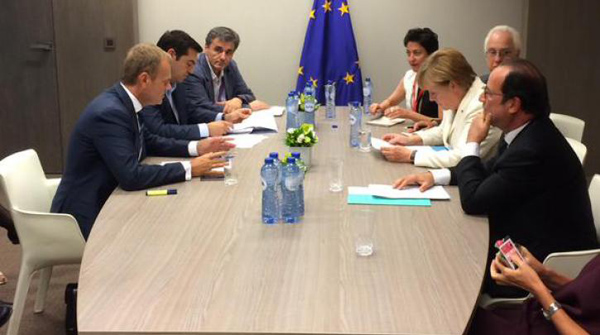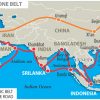
The Eurozone, and by extension the EU, has avoided a serious trip-up with Greece, although the danger is by no means past on what will be a long and difficult road ahead, at a very high cost to the Greeks and to the European project itself. Nevertheless, the third bail-out negotiations remain to be carried out, once Greece has undertaken a series of immediate reforms and made a convincing commitment to others. There is no guarantee that the agreement forged with Greek blood, sweat and tears will be a success and the EU will emerge from this crisis in a worse state than when it broke out, with less credibility and divided by some deep fissures.
- For the time being, the worst-case scenario has been averted. AGreek exit from theEuro, disastrous in the short-termforthe Greeks themselves, would have broken the Monetary Union’s supposedirreversibility, turning it merely into a fixed exchange-rate area, with dire consequences forother possible casesin the future, perhaps involving some of the ‘big’ countries, likeItaly,Spainand evenButthe fact that the German governmentput such a possibility on the negotiating table, andused it to exert pressure, may have caused damage of incalculable consequences to the Union’s long-term credibility. And the prospect is still there: in any number of days,monthsor years there might be a repeat of the Greek affairand, accompanying it, doubts about the euro will re-emerge, becauselittle has actually been resolved.
- The brinkmanship with which the EU has negotiated internally has made it lose both inward and outward credibility. Understandably, the lenders seek guarantees, but they have treated Tsipras, and Greece, as if they were enemies to beat or make submit –in the form of a latter-day Versailles–, not as partners –however wayward– that require help. The EU appears to have forgotten both its origins and its past.
- The internal dynamics of Europe’s societies are turning against Europe and are largely behind what has happened and of the situation’s political mismanagement. The demoi are divided and there is not, nor will there be, something that would be an essential part of the solution: a European demos. Eurosceptic movements are growing, closely in parallel with xenophobia in the northern EU, and now in the East, and with the rejection of austerity in parts of the South. Strangely, there is a point of contact between them, with Marine Le Pen supporting Tsipras in the European Parliament. The revolt against the status quo not only jeopardises confidence in Greece but also undermines the mutual trust that is an essential cement binding Europe together. And this makes it more unwieldy to operate.
The debate on immigration and on the allocation of refugees escaping from conflict is an apt but shameful reflection of the situation. Today there is less of an inclination for solidarity and integration, even in Eastern European countries, which have had troubled pasts (much like Spain, although from the opposite side of the political spectrum).
This time, the agreement for a third Greek bail-out for three years is based on the Stability Mechanism (ESM). Once negotiated, it will have to be ratified by several national parliaments that will be tough nuts to crack, including those of Germany, Estonia and Finland. So the result is not at all guaranteed. The Finnish Minister of Foreign Affairs, Timo Soini, who leads the country’s Eurosceptic populist party, described the Greek drama before the agreement as ‘simultaneously a parody, a comedy and a tragedy, that will continue as long as the milkmaid has a cash cow to milk’. - The EU’s institutional dynamics have also suffered. The Commission and its President have lost authority, and so has the President of the European Central Bank, Mario Draghi, even though he was the most opposed to the German threat to expel Greece from the Euro, however temporarily. The most positive aspect has been the debate in the European Parliament with Tsipras.
- There is a clear estrangement between France and Germany, both in their public opinions (in June two thirds of the Germans were in favour of Greece leaving the euro, much more than in France) and their governments. Hollande has gone one way and Merkel the other, and they have only come to an agreement when everything was on the brink of disaster. But the fact that Germany, contrary to France, went to the extreme of proposing a temporary suspension of Greek membership of the euro makes evident not only the thinly veiled German intention but the poor state of the Franco-German axis, which is necessary but no longer sufficient in a Union of 28. This is part of the division in the EU and the Eurozone that runs deep: not only between the rich and the less rich, but even within Social Democracy itself, a political family that has been central to the European construction process. Note the current attitude of certain Nordic social-democrats against Greece. The dominant centre-right popular parties are more united.
- Political leadership in Europe has wilted. No one led the way, showing the rest which way to go. Leading is not the same as commanding. Merkel has failed to be a leader with a clear vision of the target ahead, unlike Kohl. The latter, at the time, convinced his reluctant countrymen to renounce the German mark in favour of the euro, of which they have been the biggest beneficiaries. The other leaders of the Eurozone (and the EU) have been invisible. Hollande only stuck his head out at the very end.
- In addition to a coincidence of irresponsible attitudes, there has been collision of democratic legitimacies, of concepts of sovereignty. The Tsipras referendum (which sought to prevent a rupture in Syriza, which may very well occur now) went against the idea of shared sovereignty that is at the basis of European integration. The current Greek Prime Minister has kept insisting, after the agreement, on continuing to ‘regain sovereignty’ when the game in Europe is now quite different. And the clash has occurred when democratic standards have dropped within the EU. Today, Hungary, to quote one example, would fail to fulfil the so-called Copenhagen criteria for EU membership.
Rodrik’s trilemma adapted to the Eurozone (which states that it is not possible to retain sovereignty, economic union and democracy at the same time, with it being only possible to have two at the same time), which has been very much to the fore these days, can only be solved with a European demos. National sovereignty, linked to a way of viewing democracy, has again become the problem for progressing in Europe. To achieve democracy, Europe’s leaders have either to give up economic sovereignty or apply it to the benefit of their citizens. The former is not allowed by national internal dynamics, the latter by the system itself. - The way Greece has acted, in violation of club rules and clearly cheating, has also had its impact. Both the conservative and socialist governments before Tsipras cheated, and Brussels was well aware of the fact for a long time. As Martin Wolf has noted, the responsibility lies not only with the Greeks but also with their creditors and those who let them knowingly enter the Monetary Union in 2001, when the country was patently unprepared.
Although it remains to be seen what happens at the forthcoming Greek elections, to be held before the end of the year, we could be facing a paradox: that after the cheating in which its predecessors engaged it is a government of the radical left that will eventually carry out the necessary reforms: not only cuts, privatisations (with a new fund supervised from Brussels) and liberalisations (the dominant obsession in this Europe) but building up a State (with an effective tax-collection system, a land registry and a reliable judiciary) that Greece very much needs.
Along with the announcement of such a tough deal, the Eurozone summit in Brussels should have sent a clear message that Monetary Union needs to move decisively towards integration as indicated, for instance, by the report of the five presidents: fiscal union, a European treasury, political union, etc. But no, the internal dynamics of each country that have been shown up in this crisis have prevented it. Nonetheless, it is clear that the Eurozone cannot remain stationary: either it progresses with determination against the current of national internal dynamics or it starts to fall apart. For the time being, something has definitely been broken.


